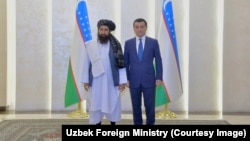Afghanistan’s Taliban said Thursday that Uzbekistan had accepted their appointed ambassador, and both sides marked the action as an important advancement in strengthening diplomatic ties between the neighboring countries.
The action is seen as a rare diplomatic achievement for the internationally isolated Taliban leaders since they regained control of the country three years ago.
Until now, China and the United Arab Emirates were the only two countries that had formally accredited a Taliban-appointed ambassador since Afghan insurgents regained power in Kabul.
None of the three nations has recognized the Taliban as the official government of Afghanistan, and neither has the rest of the world, citing concerns about inclusivity, terrorism, and restrictions on women's access to education and work.
The Taliban's foreign ministry identified its diplomat to Tashkent as Sheikh Abdul Ghafar Bahr, saying he formally presented a copy of his credentials to Uzbek Minister of Foreign Affairs Bakhtiyor Saidov on Wednesday.
"Bahr described the upgradation of bilateral relations as a pivotal phase, hoping for further progress,” the Taliban quoted their ambassador as saying at Wednesday’s ceremony to welcome him in the Uzbek capital.
The statement quoted Saidov as noting that “both countries enjoy shared interests and have achieved substantial economic growth over the past three years.” The Taliban said that Bahr “is expected to present his original letter of credence” to President Shavkat Mirziyoyev of Uzbekistan.
“Our countries share a common history and interests of prosperity that serve as an impetus for the development of cooperation ties in all areas,” Saidov said on his social media platform X, formerly known as Twitter, after Wednesday’s ceremony. "We also discussed the acute topics on bilateral, regional, and global agendas,” the Uzbek foreign minister wrote.
The Taliban separately stated Thursday that their Ministry of Mines and Petroleum had signed a 10-year contract with an Uzbek company for the exploration and extraction of gas in Afghanistan.
The announcement said the agreement requires the Uzbek company to invest $100 million in the first year and $1 billion over the next 10 years. The investment will target the gas reserves of the Totimaidan field in the northern Afghan province of Faryab, which spans an area of about 7,000 square kilometers.
Russia reported last week that a "principal decision" had already been made to remove the Taliban from its list of transnational terrorist organizations, saying relevant Russian agencies were “putting finishing touches” on the delisting in line with federal law.
U.S.-led Western countries have been pressing the Taliban to reverse restrictions on women’s freedoms and their right to education as well as employment before they could consider engaging diplomatically with Kabul. Washington also wants the de facto Afghan rulers to address regional and international terrorism concerns.
“We have not changed our designation of the Taliban as a specially designated global terrorist organization, and we continue to make clear that any significant steps towards normalization of relations is contingent upon a profound shift in the Taliban’s human rights conduct,” Matthew Miller, the U.S. State Department spokesperson said on Tuesday.
“We continue to work with our allies and partners to press the Taliban to reverse their discriminatory edicts, and we make sure that any significant steps toward normalization of relations are contingent upon profound improvements in their treatment of women and girls, including but not limited to allowing women and girls back in school and lifting the restrictions on women’s employment,” Miller explained.
Taliban leaders defend their governance, arguing that it is in line with their interpretation of the Islamic law of Sharia. They also rejected criticism of their curbs on Afghan women’s access to education, employment, and public life at large.
Abdul Kabir, the Taliban's deputy prime minister for political affairs, reportedly said Thursday that their government aims to maintain positive relations with all countries. However, he emphasized that “they will not sacrifice Islamic principles or values to please others.”
Kabir asserted in his remarks that the Taliban are currently in control of “40 diplomatic missions in different countries and engagement with the world is moving in a positive direction."






